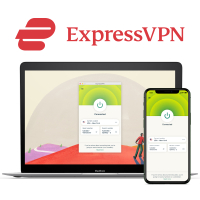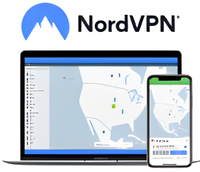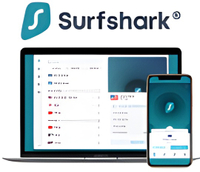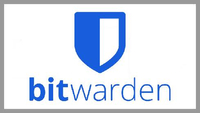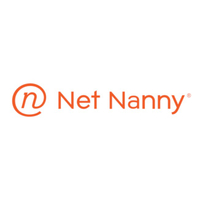How to protect your child on their new computer
How to properly secure the computer you got your child for Christmas

- Top 3 VPNs
- How to choose a VPN
- How we test VPNs
- VPN FAQs
- Top 3 antivirus
- How to choose an antivirus
- How we test antivirus software
- Antivirus FAQs
- Top 3 password managers
- How to choose a password manager
- How we test password managers
- Password managers FAQs
- Best parental control app
- How to choose a parental control app
- How we test parental control apps
- Parental control apps FAQs
A brand-new computer is an excellent gift to both give and receive, especially if your child has been hoping for one this holiday season. However, its important to not forget the various dangers of the internet that a new PC could potentially expose your child to in all the excitement. These include identity theft, phishing scams, and illegal surveillance, among others.
You can protect your child’s personal details from falling into the wrong hands and their computer from malware, viruses, and ransomware by installing the best VPN, the best antivirus, and the best password manager. Additionally, using a parental control app can allow you to monitor your child's online activities and steer them clear of inappropriate content, bad actors, and targeted attacks.
However, with so many options to choose from, you need expert help picking out the best security software. That's where our team of experts at TechRadar come into the picture. We've scoured the market, testing, reviewing, and comparing the top solutions across each category to prepare this guide.
The best VPN in 2025
A virtual private network (VPN) can mask your child’s IP address and anonymize them on the internet, keeping them protected from malicious actors who may be after their online activities and personal information. That said, the best VPN services offer more than just privacy, allowing your child to access their favorite foreign content and online games that may be restricted in their region.
Here are our top three recommendations:
1. ExpressVPN: the best VPN service in 2025
ExpressVPN is the best VPN service overall, with easy-to-use apps across various devices, excellent speeds, rock-solid security, powerful unblocking capabilities, and a vast network of servers around the world.
While it’s pricier than the rivals, ExpressVPN makes up for it by offering 3 months of extra protection for free on a 12-month plan. There’s also a 30-day money-back guarantee, so you can put it to the test without risking a penny.
2. NordVPN: the fastest VPN around
NordVPN is your best bet if you’re looking for a one-stop solution for all things cyber security. In addition to the essentials, you’re getting lots of extra security tools, including a built-in antivirus, password manager, and ad and malware blockers, making it a great choice if you want to buy only one piece of software to protect your child.
It’s also the best VPN for Netflix, thanks to unparalleled unblocking powers, thousands of servers, and the fastest speeds we've ever seen. Be sure to make the most of its 30-day money-back guarantee and see how it compares to ExpressVPN.
3. Surfshark: the best cheap VPN
Surfshark's value for money is second to none, offering class-leading speeds, premium security, and unlimited simultaneous connections for less than $2.50 a month.
It works with virtually every device type, offers easy-to-use apps across every client, and unblocks any streaming service you point at it – and you'll even get a 30-day money-back guarantee so that you can try it out risk-free before you commit.
How to pick a VPN to secure your child’s new computer
When selecting the right VPN for you and your child, it's best to look for a VPN with a vast number of server locations across the globe. It's also recommended that you prioritize providers that have servers near your actual location and in regions you want to connect to, as you will not be able to access content blocked in your region or content in other regions without this.
Another important factor is how robust and reliable the security features are. Does the provider employ cutting-edge encryption and offer support for secure protocols? Do features like kill switch and leak protection work as they should? These are important considerations because they help keep your child’s information secure.
Next, consider the number of devices you want to protect. If you're looking for VPN protection for all your family members or a bunch of different devices, opt for providers that offer a high number of simultaneous connections.
Ease of use and customer support are important as well. You'll want a provider with simple apps and intuitive interfaces across the board and round-the-clock support via channels like email, live chat, and/or phone. This ensures that you can quickly receive help in case you run into any issues.
Lastly, the key is to match your budget with the features you want out of a VPN. Most of our top recommendations ask for very little and deliver loads. However, if you have very little to spare, check out our list of the best cheap VPNs.
How we test VPNs
TechRadar’s VPN testing begins at the provider’s website where we read and analyze its privacy and data management policies, whether there are any changes from the last time we reviewed it, and whether the site employs tracking cookies.
Once we've installed the provider's VPN apps on all popular platforms like Windows, Mac, Android, iOS, and Linux, we test each of them rigorously to ascertain whether they're as secure as they claim to be. While we play around with the apps, we also evaluate how easy they are to use.
We test the provider's speed at least 120 times before arriving at the final number. Lastly, to evaluate the unblocking capabilities, we throw multiple streaming services at the VPN, and that from three different locations around the world for accurate results.
Using a VPN FAQs
Is it legal to use a VPN?
In most countries, using a VPN is legal as long as you use it for legitimate purposes such as protecting your privacy. However, if you use a VPN for illegal activities, such as violating a game provider's terms and conditions or downloading copyrighted content, it can be classified as a crime regardless of where you are.
There are also countries like North Korea, China, Russia, Turkey, UAE, and Oman that have either banned all VPNs, heavily regulated how VPN companies operate within their borders or allowed only government-approved providers.
Are VPNs safe?
All of the providers on our best VPN services page are extremely safe, masking your real location so that your internet activities cannot be traced back to you.
However, if you want to find out first-hand whether a VPN is reliable, make sure it has a strict no-logs policy, supports secure protocols, employs industry-grade encryption, and comes with a foolproof kill switch and leak protection, as well as other security features.
The best antivirus in 2025
Installing an antivirus on your child's computer can help keep it safe from viruses, malware, and ransomware attacks. For foolproof safety, many antivirus companies offer extra cyber security tools, like dark web monitoring and identity theft protection on their higher-priced plans.
Our experts at TechRadar have reviewed hundreds of malware protection services, and these are the three best antivirus software right now:
1. Bitdefender: the best antivirus software overall
Bitdefender does an excellent job at getting rid of both new and unknown malware at blazing speeds, all while taking up very little space on your child's computer.
There are tons of add-ons on offer as well, including an app lock, a Wi-Fi scanner, and real-time data breach alerts – you’ll also get a 30-day money-back guarantee to try the service risk-free before you commit.
Visit the US site
Visit the UK site
Visit the Australia site
2. Norton: the best antivirus for malware and identity protection
Norton is one of the biggest names in the industry. It sets itself apart with a class-leading LifeLock feature that scans the dark web and stolen data banks for your personal details.
It's also one of the best for all-round security, thanks to tools like a password manager, identity theft protection, unlimited VPN data, and more, making a one-stop-shop for all your computer protection needs. Try it on for size risk-free with a 60-day money-back guarantee.
Visit the US site
Visit the UK site
Visit the Australia site
3. Avast One: the gamer's ally
Avast One is among the very best when it comes to identifying and removing malware, plus it's great for gamers, courtesy of its game mode that's enabled by default and removes irritating ads, popups, and reminders.
The free tier can be ideal for those on a tight budget, although we'd recommend the paid plans for additional perks, including Avast’s SecureLine VPN, an app locker, and a system scanner.
Visit the US site
Visit the UK site
Visit the Australia site
How to pick an antivirus to secure your child’s new computer
Before anything else, look for a program with a rock-solid antivirus engine, which is the mainstay of any antivirus software. This also impacts the malware-detection rate, which should be high—anything over 95 percent should be good to go.
The best way to zero in on quality antivirus software is to combine our detailed antivirus reviews with the ratings given by independent labs, such as AV-TEST and AV-Comparatives, that test the most popular antiviruses by throwing thousands of threats at them on a daily basis.
Next, consider the level of security you want. Entry-level plans or even free antivirus products like Bitdefender or Windows Defender can be more than enough for basic protection.
However, if you want all-round protection from all sorts of cyber threats, and want to protect a ton of devices simultaneously, we'd recommend full-fledged internet security suites that come with extra cyber security tools, such as dark web monitoring, parental controls, password manager, and backup software, among others. You may also look for a solution that automatically screens email attachments before you open them, and also checks websites before you load them.
Are you a computing novice or a techie? If the latter, look for an antivirus solution with plenty of customization options that may allow you to tweak every detail and function to your liking. On the other hand, if you're new to antiviruses, opt for plug-and-play software that will get your protected as soon as possible.
How we test antivirus software
We begin our testing by deliberately downloading malware, accessing dangerous websites, and throwing both factory and tailor-made malware files at the antivirus program.
We leverage our team's IT experience to craft malware that has never been seen before so that we can get an accurate measure of the antivirus’s malware protection capabilities.
Next, we test the provider's impact on performance by installing all of its apps on various devices, including Windows, Mac, iOS, and Android. We then launch multiple apps simultaneously, attach files to emails, and carry out similar tasks to evaluate the amount of system resources that are consumed and how much slowdown is caused overall.
It’s also worth noting that we combine our hands-on testing with the results on multiple speed test sites and independent testing platforms to ensure that our analyses are comprehensive and reliable.
Using antivirus FAQs
What is the best antivirus of 2023?
Bitdefender is the best antivirus in our testing, thanks to excellent malware detection and removal capabilities, lightning-fast speeds, and minimal storage space requirements. It's also a delight for those new to antiviruses, thanks to easy-to-use interfaces and real-time protection that's enabled by default.
We recommend opting for the Total Security plan where you'll get a ton of extra cybersecurity tools, including an app lock, a firewall, a Wi-Fi scanner, and real-time data breach alerts, all of which you can try risk-free with a 30-day money-back guarantee.
Is free antivirus enough?
Free antiviruses can do the job as far as basic protection against malware and viruses is concerned. However, paid solutions are more comprehensive and offer all-round protection from all kinds of cyber threats – because they come with extra cybersecurity tools like a VPN, a password manager, parental controls, dark web monitoring, identity theft protection, and more.
The best password manager in 2025
Even a primary school student today has multiple online accounts to handle, so, of course, your child needs a top-shelf password manager to store their passwords and passkeys – plus the best password managers also come with strong password generators, extra storage for credit card information and other personal details, and parental controls/anti-phishing protection, among others.
After hours of thoroughly comparing the top 30 password managers, here are our top three recommendations:
1. NordPass: the best password manager right now
NordPass is a value-packed password manager that's ideal for just about everybody, including individuals, businesses, and full-on enterprises. You get six multiple logins and easy-to-use interfaces across every device type.
The free plan comes with all of the basics, but you'd be better off with the premium plan that's loaded with extras and comes with a 30-day free trial and a 30-day refund policy, meaning you’ll have ample time to try it out risk-free.
2. Dashlane: the best password manager interface and security
Dashlane is the best password manager interface in our testing, and its security is equally commendable, offering real-time phishing alerts and a bulk password changer that can reset all of your passwords at once.
The premium plan is superb for all-round protection, with dark web monitoring, multi-factor authentication, secure document storage, and a bundled Hotspot Shield VPN. Put it to the test and see why it’s a close second to NordPass.
3. Bitwarden: the best free password manager
Bitwarden is tailor-made for those who have little to no cash to spare, offering premium-level features like unlimited password storage, cross-platform synchronization, and optional self-hosting for free.
If you'd also like the ability to detect weak passwords and unsecured websites and/or business-focused features such as password sharing and controlled access across various user groups, I’d recommend opting for a paid plan.
How to choose a password manager to secure your child’s new computer
A password manager’s security is the most important thing. It should use rock-solid encryption and security measures to protect your passwords and passkeys, and at the same time, it should also follow strict privacy policies so it doesn’t share your personal information with unauthorized third parties.
Now, given that all of the providers on our list of the best password managers are extremely safe and have never been hacked, the additional features on offer aka the degree of security available can become the deciding factor when out shopping for a password management solution.
For instance, if you’re pinching for pennies and/or if basic password storage and security sounds like all you want, entry-level and free password managers can do the job for you.
However, if you want to sync your passwords across devices, share them securely, log in using your biometrics, and enjoy cast-iron protection with dark web monitoring/a VPN/antivirus, paid solutions are a much better option.
How we test password managers
To make sure that we only recommend what’s best, we follow our testing methodology, where we test the top 30 password managers across core aspects and various real-world scenarios to see if everything that’s promised is in place and working smoothly.
We install the available apps on different devices – and their different browser extensions as well – and evaluate their ease of use and whether the provider can offer a consistent experience across the board.
Next, we examine all of the essential features, including auto-fill, cross-device synchronization, multi-factor authentication, and even the accuracy and promptness of the support agents by throwing genuine questions at them. After all, if/when you run into a problem, you should be able to receive help on the fly.
Password managers FAQs
What is the difference between free and paid password managers?
Both free and paid password managers offer the same level of protection and storage for passwords and passkeys but paid/premium solutions can also store your credit card details and other information that you frequently use. Plus, they come with advanced features for better safekeeping, including dark web monitoring, cross-platform synchronization, and increased storage.
Can password managers be hacked?
A password manager is at the end of the day a computer system and any computer system can be hacked. Passwordstate and LastPass are two notable instances where hackers were able to penetrate a password manager’s security systems and steal all unencrypted data, including personal information, such as names, emails, and addresses.
However, our experts review the top password managers day in and day out, meaning all of the services on our list of the best password managers are trustworthy – they employ strong encryption software and have never been hacked.
The best parental control app in 2025
With a parental control app on your child's computer, you'll be able to restrict their access to objectionable content, see who they're chatting with, what content they are accessing, and protect them against predators posing as friends on the internet.
We've put the best parental control apps under the scanner, and these three came out on top:
1. Aura: the best parental control app overall
Aura is a one-stop security solution, offering a password manager, VPN, antivirus, password storage, ID protection, and, of course, parental controls.
Setting up is straightforward as well, thanks to a user-friendly interface and clear pricing policy, and you can download the app by simply scanning a QR code on the device you wish to use it on.
2. Qustodio: the best content monitoring with a good free tier
Qustodio is one of the very few parental control apps with call and text monitoring and the ability to block phone numbers.
It also offers a fantastic free plan that’s compatible with various platforms, enables you to set rules and time schedules, as well as blocking inappropriate content.
3. Net Nanny: the best web filtering
Net Nanny is a force to reckon with when it comes to web filtering, thanks to real-time content analysis to make sure a site is safe, as well as screen time monitoring.
There's a special focus on social media protection, plus it comes with YouTube monitoring built-in and feature parity between its iOS and Android versions.
How to choose a parental control app to secure your child’s new computer
The level of control you desire and the age of your child are the two most important factors to consider. For instance, if your child is under 12, you may absolutely need the ability to block inappropriate websites and apps, whereas you’d probably want to be more forgiving with your teenage child and allow them to access certain objectionable content.
Another key factor is your budget. Premium plans offer just about every surveillance tool you may need, including geofencing, an app blocker, and the ability to block and log calls and text messages, among others. However, if your needs aren’t extreme, you can certainly choose lower-priced solutions that offer all basic features and won’t hurt your pocket.
Also, if you’re not tech-savvy, we'd recommend choosing an app that’s easy to use, as that will allow you to stay on top of everything and make sure that your child can't outsmart you.
How we test parental control apps
We begin our evaluation by installing all the available apps on various device types, including Windows, Mac, Android, and iOS, and then testing their features, ease of use and of setup and installation, design, and value for money, all of which comprise around 10 hours of testing per parental control software in total.
Our testing also includes reading parent concerns and other reviews, especially those of long-term customers, so that we can get a real and accurate feel of the usability of the platform.
While we’re at it, we also try to compare multiple apps side-by-side on the same platforms to see which app outperforms the other and in what aspects. This helps us accurately rank the products on our list of the best parental control apps.
Parental control apps FAQs
What are the best practices to keep your children safe online?
The digital landscape is constantly evolving and some might argue not for the better, especially on the security front. As a parent, it's important to talk to your children regularly and openly about what they do online and inculcate them with cautious online habits, such as why/when not to share personal details and pictures online, particularly with strangers.
Besides being aware of your children’s online habits and how much time they spend online plus who they talk to, you can use the best parental control software to regulate your kid's online activities and keep them protected from all kinds of dangers lurking on the internet. However, make sure that the software is constantly updated and deployed effectively.
What features should I look for in a parental control app?
While the features that may be classed as important differ from parent to parent, some core functionalities are non-negotiable. These include the ability to limit screen time so that your child's device will automatically shut down once the time limit is breached.
Other important features to look for include app/website/chat room blocking and the ability to manage multiple devices of various family members from one unified dashboard.
Are you a pro? Subscribe to our newsletter
Sign up to the TechRadar Pro newsletter to get all the top news, opinion, features and guidance your business needs to succeed!

Olivia joined Tom's Guide in October 2023 as part of the core Future Tech Software team, and is the Commissioning Editor at Tom's Guide. With a background in cybersecurity, Olivia is interested in how VPNs protect users' privacy, and how they improve online safety. She also regularly uses VPNs to make sure they deliver what they promise, and specializes in testing VPNs with streaming sites.
